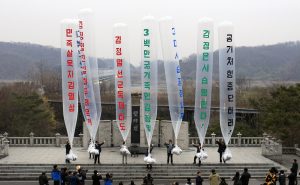[ad_1]
The Koreas | Politics | East Asia
If his claim is confirmed, Park Sang-hak would be the first known person to violate a new law banning people from sending leaflets to North Korea.

In this April 15, 2011, file photo, Park Sang-hak, center, and South Korean conservative activists prepare to release balloons bearing leaflets at the Imjingak Pavilion near the border village of Panmunjom in Paju, South Korea. The balloons read “Overthrow Kim Jong Il’s dictatorship.”
Credit: AP Photo/Lee Jin-man
Park Sang-hak, an activist promoting human rights in North Koreans and a former defector, said today that he had distributed leaflets to North Korea.
According to Park, 500,000 leaflets, 500 brochures, and 5,000 one-dollar bills were sent to North Korea from Gyeonggi province and Gangwon province, areas bordering North Korea, using 10 large balloons. He did not specify the date or exact location of the activity, to block the possibility of the government regulating future launches.
Weeks before, Park had expressed his intention to send leaflets to the North. After Park announced the latest launches, he argued that the legislation that bans people from sending leaflets to North Korea violates the basic rights of the people, such as freedom of expression, freedom of publication, and freedom of assembly.
The National Assembly passed the legislation in December 2020. The move came after Kim Yo Jong, sister of North Korean leader Kim Jong Un, had demanded the government ban provocative activities from North Korean defectors that could deteriorate the relationship between the two Koreas. The government supported the legislation, saying it was needed to ensure the safety of residents living near the border and to avoid unnecessary tensions with North Korea.
Park declared that he is not afraid of being sentenced to prison for sending the leaflets, saying he would tell the truth to 20 million starving North Korean compatriots. He accused the South Korean government of siding with Kim Jong Un and cracking down on North Korean defectors fighting for the liberation of the North Korean people.
In response, a spokesman for the Ministry of Unification said today that if the activity is confirmed with the relevant agencies, it will respond in accordance with the relevant laws. As of writing, no government agency has confirmed that leaflets were in fact launched. If confirmed, it would be the first known case of an activist sending leaflets to the North since the National Assembly passed the bill to ban it.
The legislation allows punishment of up to three years in prison and fines of up to $27,000 for distributing visual media posts and flyers to North Korea from the South Korean side of the border.
Opposition parties and North Korean human rights groups have opposed the bill, arguing it violates freedom of expression and has too broad a scope. The government has said that the measure is aimed at guaranteeing the safety of residents near the border with North Korea.
According to local news reports, Park’s leaflet launch was sponsored by Suzanne Scholte, president of Defense Forum Foundation, a U.S. non-governmental organization.
U.S. lawmakers held a video conference hearing this month and denounced the legislation banning leaflet launches as an oppression of democratic freedoms. It was an unusual move made by the U.S. Congress to hold a hearing to debate the South Korean government’s policies.
Some critics in South Korea expressed displeasure over the hearing, saying it might unduly affect the government’s decision-making process on policies toward the North.
Seoul and Washington confirmed today that the leaders of the two countries are going to meet at the White House on May 21. Experts expect North Korea to take some actions before the summit.
[ad_2]
Source link